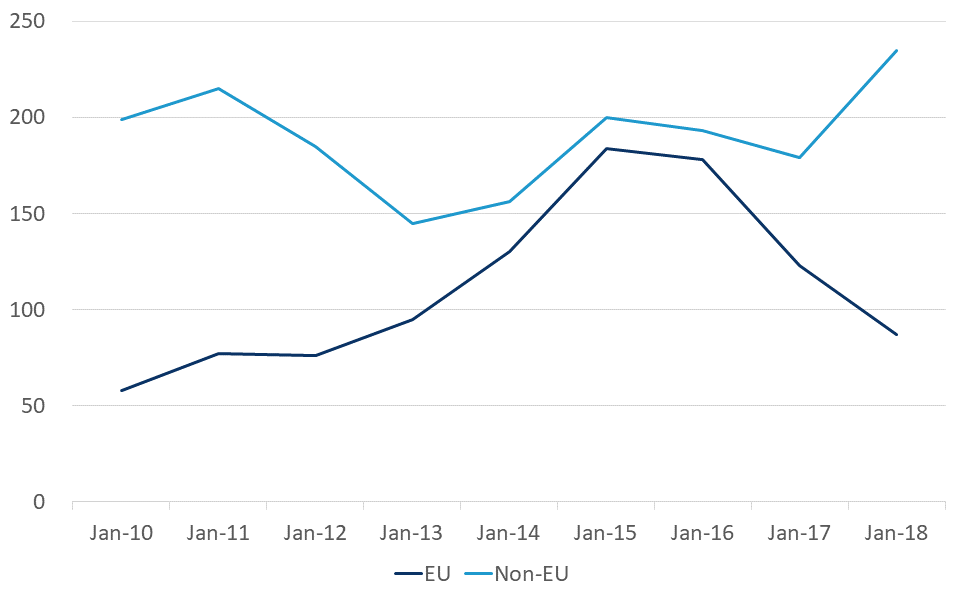Dancing Queen causes additional Brexit damage due to restriction on immigration
Theresa May dancing rigidly to the swinging tones of Dancing Queen was a beautiful political move: humour as an answer to bitterness and brusqueness among Brexiteers. With her performance and speech at the recent British Conservative Party Congress, Prime Minister May has strengthened her political position. The real Brexit negotiations can now begin. Meanwhile, the British government’s decision to draw up a stricter immigration policy – to secure greater support in the party – will hamper Britain’s future economic power. The British economy needs immigration. Even in the run-up to the effective Brexit, the inflow of foreign workers into the UK is weakening, especially from the EU. In particular, the decision to limit future migration from the EU27 will exacerbate the tightness of the UK labour market, cause a brain drain and worsen the UK’s economic prospects.
Immigration country
Immigration was the most important theme in the run-up to the Brexit referendum in 2016 as the strong influx of foreign labour into the UK was a thorn in the flesh for many British citizens. Social problems and economic challenges to them were synonymous with a failing and overly open immigration policy. Europe was blamed for a lack of effective controls at Europe’s external borders and for allowing too smooth a flow of transmigrants to the UK. For many migrants, the UK remains an attractive destination. On the one hand because it has a number of advantages for migrants such as large groups of people with a migration background that provide safety nets for fellow countrymen and a labour market full of opportunities. On the other because the UK is still seen as a gateway to the United States. Surveys of immigrants confirm that job opportunities are the main reason to immigrate to the UK. In recent years, immigration into the UK has increased significantly. Undoubtedly, this wave of immigration has created major challenges for the UK government, local authorities and the UK population. Yet the UK has also benefited greatly from high immigration. Those benefits are now in danger of being lost through a tighter immigration policy.
The new policy goes against the UK’s tradition of open immigration policies. A good example is the British stance on EU enlargement to Central and Eastern Europe. With the eastward enlargement of the European Union in 2004 and 2007, many Western European countries feared they would be flooded by Eastern European workers in search of a better life and income. That is why, during the accession negotiations, agreements were made to temporarily restrict the free movement of workers. Three countries chose to grant Eastern European workers free access anyway, namely Sweden, Ireland and the UK. Various studies since then have shown that these countries experienced a strong economic stimulus as a result of their relatively open immigration policy.
Economic Impact
There is extensive UK-specific literature that confirms immigration had a positive impact on British economic growth. In addition, several studies have shown that immigration did not reduce the job opportunities of the native-born population. Immigration did, however, increase income inequality by having a limited negative effect on the lowest wages. Immigration of the low-skilled contributed to the flexibilization of the labour market, which benefited industry, the hotel and catering industry and the tourism sector. Finally, recent immigration also contributed to productivity growth in the British economy through cost savings in production processes.
Many studies have attempted to measure the economic impact of various Brexit scenarios. The focus of these studies is mainly on international trade effects, sometimes supplemented by investment effects. Much less attention has been paid to the impact of a modified immigration policy. A limited number of studies have calculated the isolated impact of reduced migration (e.g. Forte and Portes, 2016). Those studies point to a negative impact on British economic growth, with the effects being of the same order of magnitude as the trade effects. In other words, taking into account immigration policy changes would double the negative growth effect of Brexit measured by most other impact studies. However, this should not be the final conclusion. Only an integrated analysis of the trade, investment and migration effects of Brexit can provide the complete picture. This exercise is extremely complex, like the whole Brexit itself of course.
Don’t wait for Brexit
Recent migration figures show that EU immigrants are not waiting for Brexit to leave the UK. Net inflows from the EU are falling significantly, but remain positive (Figure 1). While many immigrants from the EU are returning to their home countries, the UK remains attractive to new immigrants from the EU. However, the decline in net inflows from the EU contrasts sharply with the increase in net inflows from non-EU countries.
Figure 1 - Long-term Immigration to UK (in thousands)

It is striking that the educational attainment of EU immigrants in the UK is particularly high compared to the situation in other European countries (Figure 2). 43% of EU immigrants have a university or higher education degree. A further 42% have at least a secondary education degree. Thus, by restricting immigration from the EU27, the UK risks losing a significant amount of knowledge and talent for its labour market.
Figure 2 - Migrants from the EU by educational attainment, % (2014)

Think twice
A stricter immigration policy towards the EU27 seems to be the bargaining chip Theresa May wants to use to gather sufficient domestic support for her Brexit plan. This strategy seems flawed, however, as the economic effects of limiting immigration from the EU27 will probably reinforce the negative economic impact of Brexit. The British labour market will not only be losing numbers, but also talent. In addition, the United Kingdom will be undermining the possibility of a continued strong economic integration with the European continent in the longer term. After all, the free movement of workers is essential for cross-border trade, especially in the service sector, where the centre of gravity of the British economy lies.
